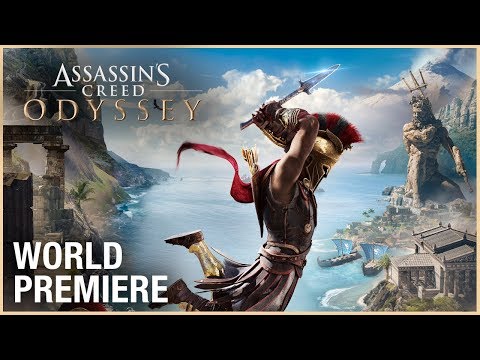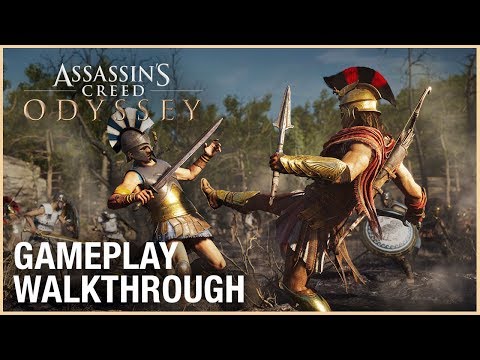The two-year gap between Odyssey and Assassin’s Creed Valhalla gave Ubisoft the time to improve the former’s formula. While two years might not be much, it’s an exceptional period for the Canadian developer. So, if you like one of these games, you’ll probably like the other. That said, Assassin’s Creed Odyssey, as an open-world action-adventure game, is rough around the edges.
What’s new on Assassin’s Creed Odyssey?
Assassin’s Creed Odyssey takes back the improved gameplay Origins showcased and adds additional RPG elements. If you skipped the last title or haven’t played the saga for a while, you’ll feel it’s an entirely new franchise. Improved elements include open-world exploration, resource gathering, gear gathering, and choices. You can even choose sides, a decision that changes your playthrough moderately. With these new elements, though, comes a downgrade of the stealth aspect of the game. Most people said all Assassin’s Creed games were alike, so Ubisoft took a different path with this Greek tale. Overall, this is a fully-fledged RPG that grants you the ability to play for hours and hours.
Visuals & design
Ubisoft takes the franchise to Ancient Greece, during the 431 a.c. Developers used many elements to place you within context, from weapons to fighting styles, music, cities, clothes, and landscapes. See, a great deal of the game’s appeal is its design. Greek islands come to great detail in Odyssey. There’re not many different landscapes to see, but, either way, the world is massive. For example, there’s a massive sea you can explore for treasure, naval combat, and reach other islands. Similarly, the primary campaign and side quests cover a lot of locations. There’re temples, forests, theaters, cities, shores, islands, and more as part of your epic quest. There’s a great variety in scenarios as well, from chilly mountains to tropical islands. On top of that, exploring the world also uncovers vastly different cultures, which makes for an interesting game to see. The world is indeed gorgeous. For instance, sailing the Aegean sea at the night delivers best-looking scenarios Ubisoft has ever created.
Console & PC performance
The visuals are gorgeous and rich in color. Valhalla doesn’t feel much like an upgrade compared to Odyssey. Odyssey looks just as good as a PS4 Pro or Xbox One X game can look. It’s not a new-gen game, though, so load times and lower frames are persistent. Still, playing on PC allows you to play on ultra 4K plus a higher FPS. It dramatically increases textures, lighting, shadows, and field of depth for extra immensity. Playing the game from an SDD drive also delivers faster load times. As for performance, it didn’t have a steady framerate on launch. However, this is non-existent nowadays. Other than a few glitches, the game currently runs flawlessly. The sheer size of the game is not friendly, though. People with limited time to play will feel Odyssey is a nightmare. 150+ hours of content is a lot. But it does follow core elements the best games of its genre have. It delivers a formulaic open-world title that’s solid enough to enjoy.
Main story arc
You play either Alexios or Kassandra. It’s the first time you can play either men or females on the franchise. Either way, Layla Hassan is the present-day main character. We met her on Assassin’s Creed: Origins. That said, the animus side of the story is light, the lightest it’s been on the franchise. If you don’t know what this is, the Animus is a time-witness machine that plays the game as “memory sequences.” It’s part of an over-reaching plot of Assasins vs. templars, but these elements are far and in-between in this title. Having said that, the story revolves around a family drama. Your a Leonidas descendent living as a mercenary until a greater adventure calls you for greater honor. The main quest makes you choose between two sides of a family conflict. After the character’s father left him for dead, you must return to your roots to help set aside the differences. There’s a parallel storyline as well. It revolves around taking out an evil cult that’s gathering magic elements across the Agean sea.
Branching desitions
Odyssey is as far away from the Assasin’s vs. Templar’s arc as it can. If you were tired of this formula, you would see something new here. However, it seldom feels like an accurate AC title. These changes come with increased freedom. For example, you get to choose your path during your adventure, and your choices will reflect on your gameplay. Even short side quests can have different endings depending on what you do. Also, being away from the titular conflict, Odyssey instead revolves around war. You play around the Peloponeso war this time, a conflict between Delos and Peloponeso leagues for control of Ancient Greece. This delivers the perfect scenario to live through countless battles, both in the sea and its land. The battle gameplay, although highly repetitive, is also exciting, frenetic, and smooth. And even though the main story arc is not very engaging, there’s something else to latch on to. Seeing how your decisions play a role and branch into different consequences is fantastic. It’s almost as good, if not just as good, as fully-fledged sandbox titles Fallout 4.
Side quests
The main arc takes a while to get interesting, partly because there’s a ton of activity to do before going to the main quest. Diversions are everywhere, whereas the overall narrative is not as engaging as it should be. It tries to be a Witcher title with the atmosphere, the vibe, and the horse riding. However, it lacks the character’s personality and an interesting main quest to make you hang on. In fact, discussing the main quest is not even enjoyable. It feels like the game puts greater emphasis on the side content. And there’s something about the game that makes it feel massive and overwhelming. With a never-ending map marker to explore, the game often becomes a to-do list, a grind fest. Some people would think that’s great. Others prefer straightforward storytelling with solid character moments to live. There’s not much of the former here, though. As for activities, these include participating in the war, sailing, and finding underwater treasure. You can also complete Contracts, Bounties, and Mercenary jobs. Additionally, you can collect resources to upgrade your gear. Lastly, there’re tons of traditional sidequests to play. For example, you get to rescue lost sailors, capture a pirate ship, or find lost relics.
Gameplay
As the last part of our Assassin’s Creed: Odyssey, we must talk about the gameplay. For example, naval combat is similar to AC: Blackflag, which was already great. There’s nothing new here compared to other AC titles or other games in the action-adventure genre. However, it executes the action smoothly. Land combat works with an immense variety of weapons. You’ll be changing weapons every 20 minutes or so, and weapon types feel and work differently. The game can be challenging. You get to parry, dodge, and attack, much like origins. There’s also a skill tree where you unlock new moves as you level up. These abilities are satisfying and make an immense difference. You can map them on your buttons to use them during combat. This is new to the AC franchise. There are also new abilities never seen before in the saga. For example, Second Wind grants you the ability to heal up. Moreover, abilities cover stealth, close, and ranged combat. And while the game’s length might be a downside for sum, Odyssey does manage to stay consistently fun all the way to the end. Thanks to the gameplay and frenetic abilities, you’re sure to have a good time if you’re there to enjoy smooth combat mechanics. Even if your playthrough comes down to grinding, combat, and exploration
Is Assassin’s Creed: Odyssey better than Origins?
Odyssey feels like yet another course correction for the franchise. Whereas Origins started to do things differently, Odyssey is where Ubisoft decided to change the franchise’s approach. In a way, Odyssey is the Assassin’s Creed title for players bored of the saga. It’s also the title for players looking for fully-fledged open-world action RPG games. As an open-world RPG, Odyssey is fantastic. It’s massive, gorgeous, smooth, and consistently fun. As a storyteller, it’s maybe less-than-okay, but nothing to be mad about. I would say yes, it’s better than Origins. Great work by Ubisoft.
Are there micro-transactions on Assassin’s Creed: Odyssey?
There’re are. Whereas most microtransactions are cosmetic items, there’s a way to buy XP boosters to make the grind easier. Many players see an XP booster as an offensive offer.
Do I need to play Origins to play Odyssey?
You do not. Odyssey rarely uses the core narratives of the AC saga, and, in fact, it doesn’t move the story forward. You can play it as a first-timer without losing much.








